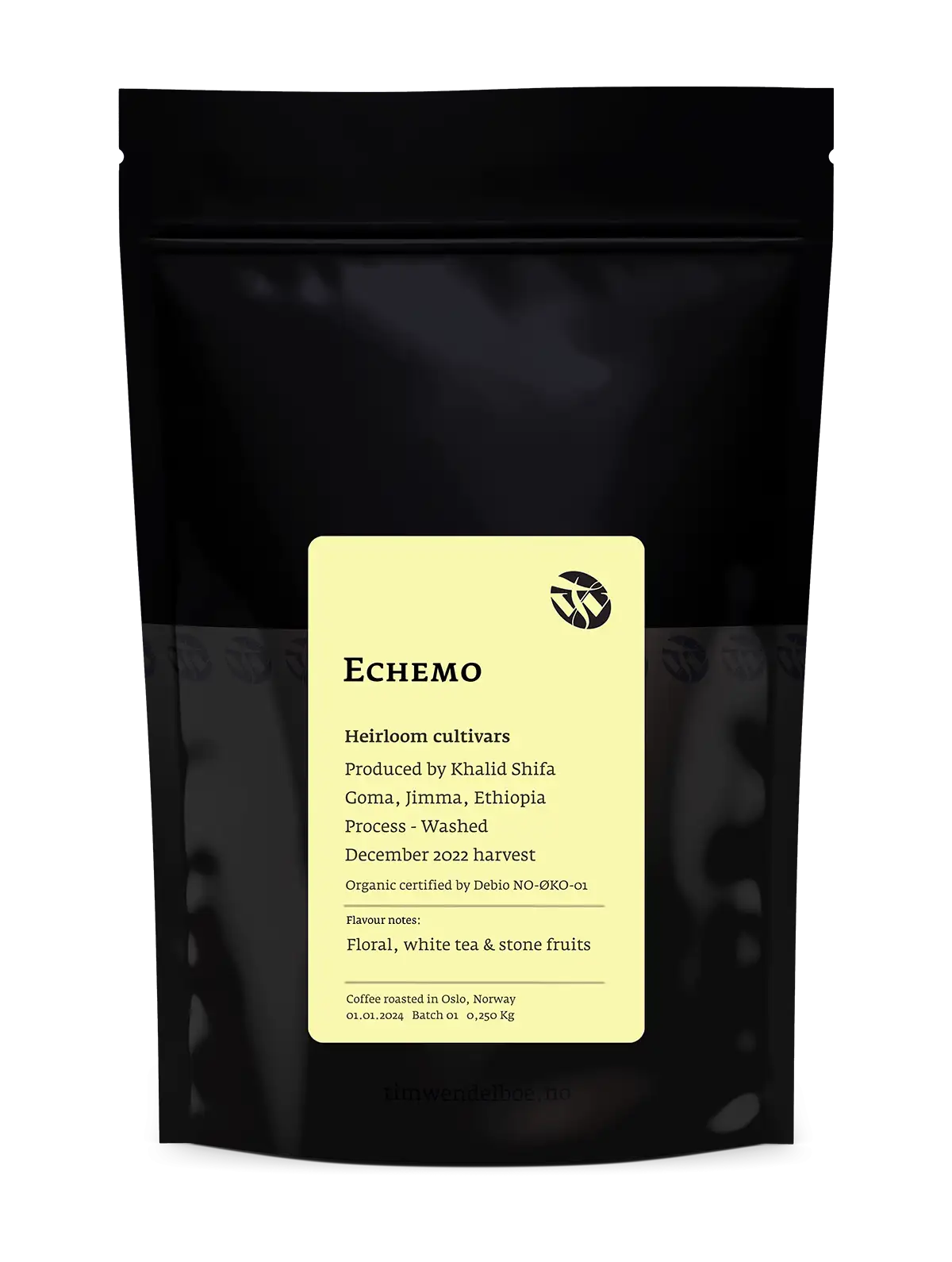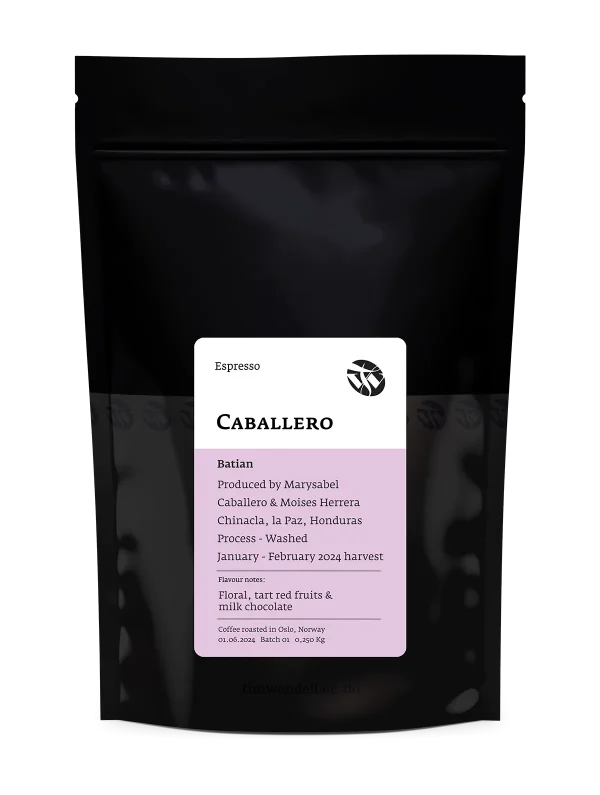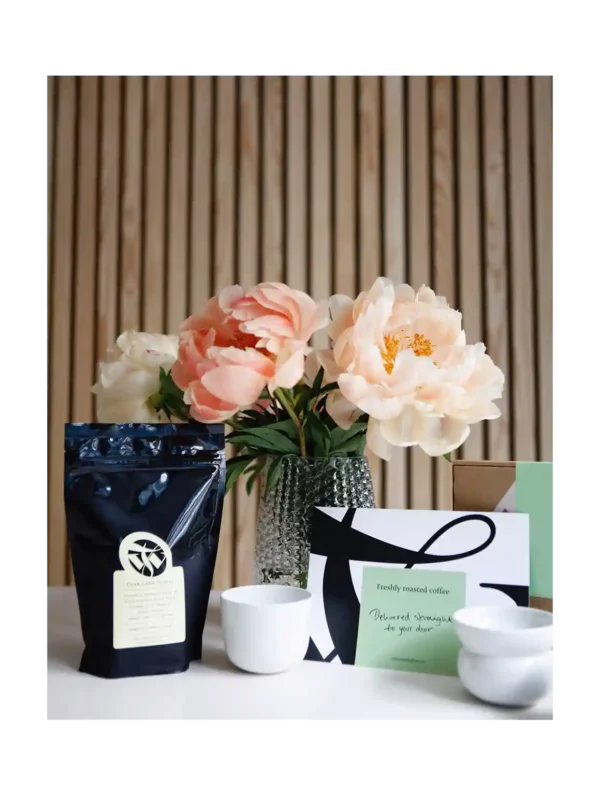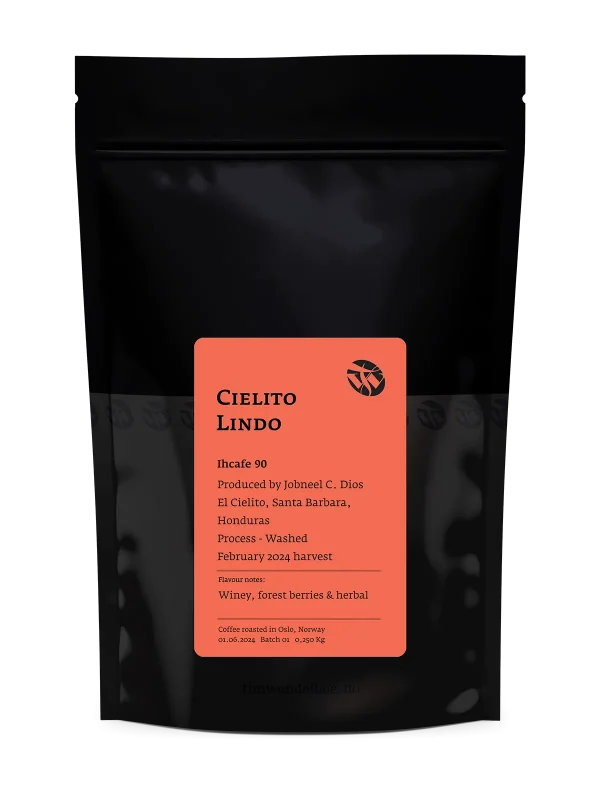| Cultivar | Ethiopian heirloom from Coche forest |
|---|---|
| Flavour Notes | Floral, white tea & stone fruits |
| Producer | Khalid Shifa |
| Country | Ethiopia |
| Region | Goma, Jimma |
| Process | Washed |
| Harvest | December 2022 |
| Roast Profile | Light Roast |
| Contents | Whole coffee beans, organic certified by Debio NO-ØKO-01 |
| Bag Size | 250g |
Echemo – Certified Organic
kr200.00
A sweet and delicate coffee with flavours reminiscent of stone fruit, flowers and white tea.
Out of stock
Additional information
Tim's Notes
Three years ago, Khalid built a new wet mill on his farm. He is now able to produce washed coffees whereas before we were only able to buy natural- and honey processed coffees from him. Interestingly I find his washed coffee to be much more expressive and flavourful with more of the classic citrus, stone fruit and floral flavours that is so common for the best Ethiopian coffees.
Having said that, this coffee has a slight less intense acidity compared to a lot of other washed Ethiopian coffees we have offered over the years. It is not a typical Yirgacheffe or Guji – like coffee, but that is probably because it is grown in a different area and are made up from different cultivars. The washed coffees from Echemo are very delicate and soft. I find it is like drinking a white tea with some nice notes of peach and florals.
Like many Ethiopian and Geisha coffees, this coffee can produce a bit more fines (dust) during grinding which means it might clog your paper filter when brewing filter style like V60, Kalita or similar. Hence you might experience much longer brew times. My recommendation is to not grind coarser but rather try to agitate the slurry less while brewing and let it take some more time to finish. High extractions of this coffee only makes this coffee more aromatic and sweet.
Having said that, this coffee has a slight less intense acidity compared to a lot of other washed Ethiopian coffees we have offered over the years. It is not a typical Yirgacheffe or Guji – like coffee, but that is probably because it is grown in a different area and are made up from different cultivars. The washed coffees from Echemo are very delicate and soft. I find it is like drinking a white tea with some nice notes of peach and florals.
Like many Ethiopian and Geisha coffees, this coffee can produce a bit more fines (dust) during grinding which means it might clog your paper filter when brewing filter style like V60, Kalita or similar. Hence you might experience much longer brew times. My recommendation is to not grind coarser but rather try to agitate the slurry less while brewing and let it take some more time to finish. High extractions of this coffee only makes this coffee more aromatic and sweet.
Cultivar
Khalid is mainly growing old cultivars that was planted by his grandfather many years ago. When establishing the farm, Khalid’s grandfather selected seeds from wild coffee trees from the the nearby Coche forest and the trees he planted are still producing well today.
Process
Picking and sorting
- The coffee cherries are selectively hand picked by hired workers from the local community.
- The cherries are de-pulped with a small disc de-pulper. Once de-pulped, the parchment coffee, with it’s mucilage still on, is wet fermented in clean water for about 12 - 24 hours. After fermentation the coffee is graded and washed in a small washing channel in order to remove the remaining mucilage and grade out the light coffee beans.
- The coffees are dried on elevated drying tables where defect parchment coffee gets sorted out by hand. Drying the coffee takes about 10–12 days. During daytime the coffees are raked to ensure even drying. The drying tables are covered during the hottest times of the day to avoid over heating and also at night time to prevent condensation. The drying process is finished when the moisture content in the coffee beans is between 10-12%. After drying, the coffees are stored in jute bags before delivery to the dry mill. The coffee is de-hulled before the green coffee beans are transported to the mill in Addis Ababa where they get cleaned and sorted before packaging for export. The coffee was packed, exported and stored in jute bags with a grain pro bag liner.
Shipping
- For details on our current shipping information, please visit our FAQ page here.
- If you still have any questions, please contact us here.
How To Brew
Filter
- We strongly recommend using the correct measurements and brewing techniques when you brew our coffees. Use a digital scale both to measure water and coffee in order to get consistent results, and we recommend using between 60 to 70 grams of coffee per litre (1000g) of water, depending on the brewing method, water quality and coffee used.
- We strongly recommend using VST filter baskets. Both the 18g, 20g and the 22g basket is great for our coffee. The VST filters makes it a lot easier to extract the espresso properly which gives a lot more sweetness in the cup. They are also more or less identical to each other which makes it easy to be more consistent when brewing on several groups at the same time. You can buy the filters on our webshop, just make sure they fit your machine (ours fits all La Marzocco machines and machines with 58mm filter baskets). With the VST 18g filter basket, we recommend the following brewing parameters: 18-19g freshly-ground coffee, 25-35s brewing time, 35-38g of final brew liquid in the cup, 93°C-94°C brew water temperature.




